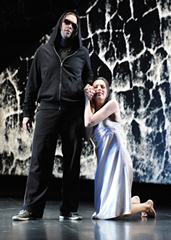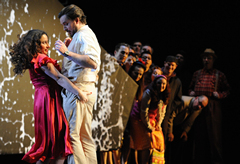| The singing wins the day in this updated Giovanni by Sarah Noble | |
| Mozart: Don Giovanni Opera Australia Sydney Opera House 5 July 2008 | |
| Neidhardt's Giovanni is a callous, drug-taking playboy whose downfall is wrought not by the Commendatore's vengeance but by his own reckless lifestyle - the statue becomes a figment of a cocaine-induced hallucination; Giovanni's demise is the result of an excruciating overdose. Along the way, he assaults and is assaulted (sometimes explicitly) by various characters to whose lives he has blithely laid waste - a harmlessly trashy Zerlina, a garrulous and overwrought Elvira and his reluctant wing-man Leporello, all rendered in charmless modern style. The very concept will be anathema to some. Still, this is an opera rife with truly nasty behaviour and there is something to be said for an unflinching exposition of that underbelly - it's a valid, if not ideal or intrinsically appealing approach to the work. But it's an approach which requires both a cohesive vision and genuine innovation to succeed, and unfortunately Neidhardt's production delivers neither. Wavering between gritty realism and twisted stylisation without settling satisfactorily on either, this is a frustrating Don Giovanni in which momentary flashes of inspiration and black humour are promptly dulled by confused direction and unremittingly ugly sets. It's not all bad news, however. This may be a theatrically disappointing Don Giovanni, but its musical values are exceedingly high. Russian maestro Mikhail Agrest leads a tense and fast-paced performance, highlighting the fervour and turmoil of the score without denying its lyricism. Following a Mozartian precedent, Neidhardt and Agrest have cut the moralising sextet finale which usually ends the opera, choosing instead to finish with Giovanni's demise. It's an abrupt but curiously effective conclusion, although it probably requires even more decisive playing and singing to really make its mark. | |
|
As an expensively attired and pathologically repressed Donna Anna, Rachelle Durkin sings with icy brilliance and fearsome virtuosity. Her stage presence is sometimes unfocused but vocally it's a powerful characterisation; her "Non mi dir", sung on the verge of a breakdown to an emotionally (then physically) absent Don Ottavio, is sensational. She's the polar opposite of Catherine Carby's hysterical Donna Elvira, a chaotic, gaudily dressed mess who can't even walk comfortably in her own preposterous pink high heels. Carby's voice may be a shade small for the role but she tackles it fearlessly and with astounding commitment; her staggering "Mi tradi" is possibly the production's finest moment. Current Young Artist Amy Wilkinson shows promise as a tarty Zerlina, singing with sweet, if sometimes strident, tone. Richard Anderson is a solid, conventional Masetto, singing well but apparently oblivious to the updated setting. Henry Choo's Don Ottavio is sung with his usual lilting beauty and pristine diction, but his ineffectual stage presence does little to enliven this basically gormless character. As the Commendatore, Jud Arthur is in characteristically towering voice, dominating the stage even while invisible. The chorus (in reduced form) sings with strength and spirit, particularly as the invisible spirits who drag Giovanni away. Visually, there's little to love in this barren modern-day Don Giovanni; aurally, it's another story entirely. See it for the singing, then; and if necessary, just close your eyes. | |
| Text © Sarah Noble Photos © Branco Gaica |
 Don Giovanni is Mozart's darkest, most ambiguous work. Comic episodes punctuate a sinister tale of dark deeds and darker consequences; stock opera buffa characters mingle with - and themselves become - villains and victims. Such fascinating complexity invites subversive interpretation, and numerous directors have proved powerless to resist. Most recent to heed that call is Australia's Elke Neidhardt, whose bleak, black 21st century Don Giovanni opened this week in Sydney.
Don Giovanni is Mozart's darkest, most ambiguous work. Comic episodes punctuate a sinister tale of dark deeds and darker consequences; stock opera buffa characters mingle with - and themselves become - villains and victims. Such fascinating complexity invites subversive interpretation, and numerous directors have proved powerless to resist. Most recent to heed that call is Australia's Elke Neidhardt, whose bleak, black 21st century Don Giovanni opened this week in Sydney.  Hungarian bass Gabor Bretz brings rugged self-assurance and a warmly expansive voice to the title role. In manner and in voice, his is a brutish Giovanni, in keeping with Neidhardt's vision; Bretz slides convincingly into character as a present-day bad boy. Narcissism is key - he is most compelling in the manic "Finch'han del vino" and later, in his wretched final scene; moments of suave seduction are less persuasive. Bretz's limelight is very nearly stolen, however, by Joshua Bloom's terrific Leporello. Bloom is the ideal comic foil, providing humour without resorting to pantomime comedy; he's also in magnificent voice, his "Madamina, il catalogo è questo" as mellifluous as it is funny.
Hungarian bass Gabor Bretz brings rugged self-assurance and a warmly expansive voice to the title role. In manner and in voice, his is a brutish Giovanni, in keeping with Neidhardt's vision; Bretz slides convincingly into character as a present-day bad boy. Narcissism is key - he is most compelling in the manic "Finch'han del vino" and later, in his wretched final scene; moments of suave seduction are less persuasive. Bretz's limelight is very nearly stolen, however, by Joshua Bloom's terrific Leporello. Bloom is the ideal comic foil, providing humour without resorting to pantomime comedy; he's also in magnificent voice, his "Madamina, il catalogo è questo" as mellifluous as it is funny.